|
 Secure Site
Secure Site
|
 |
 Sleep sounder with pure essential oils Studies indicate that certain aromas may promote sounder sleep, enhance dreaming, and improve awareness and receptivity the following day. EEG (electroencelphalogram) tests at the Smell & Taste Treatment and Research Center in Chicago indicate that lavender increases alpha wave activity in the posterior portion of the brain and helps induce sleep. “Alpha wave activity increases when you are relaxed,” says Alana Hirsch, M.D., medical director at the Center. “Put a few drops of lavender pure essential oils on your pillowcase before going to bed,” Hirsch recommends. Studies also show that vanilla helps people fall asleep quicker and promotes faster movement into the REM or dream state, he adds. In addition, research at the Society of Psychophysiological Research found that sleepers in jasmine-scented rooms enjoyed better quality sleep and morning-after alertness than those that slept in a non-scented room. To start sleeping sounder, purchase organic vanilla essential oil at your local natural food store or online at http://homespaorganics.com; pure essential oils of lavender and jasmine are also available at natural food stores and at www.aveda.com. Sweet dreams… adapted from Healing Lifestyles & Spas, Kyle Roderick, Sept./Oct. 2005
 Bamboo Zen Alarm Clock with Chime Now & Zen
1638 Pearl Street
Boulder, CO 80302
(800) 779-6383
Posted in Bamboo Chime Clocks, Chime Alarm Clocks, Japanese Inspired Zen Clocks, Natural Awakening, Now & Zen Alarm Clocks, Sleep Habits, Well-being
 how to cultivate compassion Cultivate equanimity in the face of life’s ups and downs, and find deeper access to joy.
A lot of people I know avoid reading the paper first thing in the morning—being confronted with all of the injustices and bad deeds in the world is an unsettling way to start the day. It’s difficult to read about the latest corporate finance scam or the obscenity of human trafficking and keep your peace of mind, and it’s even harder to know how to respond. The conflict feels even more immediate when you witness an unjust act firsthand, or are yourself the recipient of one, whether it’s having your wallet stolen, your car broken into, or any sort of hurtful behavior directed your way. The answer to this problem could be upeksha, the fourth of the brahmaviharas.
This understanding of upeksha as equanimity stresses the importance of balance. A balanced heart is not an unfeeling heart. The balanced heart feels pleasure without grasping and clinging at it, it feels pain without condemning or hating, and it stays open to neutral experiences with presence. Insight meditation teacher Sharon Salzberg speaks of equanimity as a “spacious stillness of mind,” within which we can remain connected to others and all that happens around us, while remaining free of our conditioned habit of grasping at the pleasant and pushing away the unpleasant.
Calm Within
One way to experience equanimity is to experiment with mindfulness meditation. Rather than fixing attention on a single object such as the breath or a mantra, mindfulness meditation involves the moment-to-moment awareness of changing objects of perception. Mindfulness is like a floodlight, shining awareness on the whole field of experience, including sensations, emotions, and thoughts as they arise and pass away in the dynamic, ever-changing flux that characterizes the human experience of body and mind. Mindfulness allows you to see the nature of the unfolding process without getting caught in reactivity, without identifying with your sensations, emotions, and thoughts. This insight changes your relationship to the mind-body. The waves keep coming, but you don’t get swept away by them. Or as Swami Satchidananda often said, “You can’t stop the waves, but you can learn to surf!” This ability to remain balanced amidst ever-changing conditions is the balance of equanimity.
 How to be calm within There’s an old story that illustrates the wisdom of this state of mind. A farmer’s most valuable asset is the one horse he owns. One day it runs away. All the townspeople commiserate with him, “Oh, what terrible luck! You’ve fallen into poverty now, with no way to pull the plow or move your goods!” The farmer merely responds, “I don’t know if it’s unfortunate or not; all I know is that my horse is gone.”
A few days later, the horse returns, and following it are six more horses, both stallions and mares. The townspeople say “Oh! You’ve struck it rich! Now you have seven horses to your name!” Again, the farmer says, “I don’t know if I’m fortunate or not; all that I can say is that I now have seven horses in my stable.”
A few days later, while the farmer’s son is trying to break in one of the wild stallions, he’s thrown from the horse and breaks his leg and shoulder. All the townspeople bemoan his fate: “Oh, how terrible! Your son has been so badly injured, he’ll not be able to help you with the harvest. What a misfortune!” The farmer responds, “I don’t know if it’s a misfortune or not; what I know is that my son has been injured.”
Less than a week later, the army sweeps through town, conscripting all the young men to fight in a war…all except for the farmer’s son, who is unable to fight because of his injury.
The fact is, you can’t know what changes your life will bring or what the ultimate consequences will be. Equanimity allows for the mystery of things: the unknowable, uncontrollable nature of things to
be just as they are. In this radical acceptance lies peace and freedom—right there in the midst of whatever pleasant or unpleasant circumstances we find ourselves in. When we open to the truth that there is actually very little we can control other than our own reactions to circumstances, we learn to let go. Cultivating the qualities of kindness, compassion, and joy opens your heart to others. Equanimity balances the giving of your heart’s love with the recognition and acceptance that things are the way they are. However much you may care for someone, however much you may do for others, however much you would like to control things or you wish that they were other than they are, equanimity reminds you that all beings everywhere are responsible for their own actions, and for the consequences of their actions.
Without this recognition, it’s easy to fall into compassion fatigue, helper-burnout, and even despair. Equanimity allows you to open your heart and offer love, kindness, compassion, and rejoicing, while letting go of your expectations and attachment to results. Equanimity endows the other three brahmaviharas with kshanti: patience, persistence, and forbearance. So, you can keep your heart open, even if the kindness, compassion and appreciative joy you offer to others is not returned. And when you are confronted with the nonvirtuous deeds of others, equanimity allows you to feel compassion for the suffering that underlies their actions as well as for the suffering their actions cause others. It is equanimity that brings immeasurability or boundlessness to the other three brahmaviharas.
adapted from Yoga Journal Magazine, by By Frank Jude Boccio
Frank Jude Boccio is a teacher of yoga and Zen Buddhism and the author of Mindfulness Yoga. Find him at mindfulnessyoga.net
Use our unique “Zen Clock” which functions as a Yoga & Meditation Timer. It features a long-resonating acoustic chime that brings your meditation or yoga session to a gradual close, preserving the environment of stillness while also acting as an effective time signal. Our Yoga Timer & Clock can be programmed to chime at the end of the meditation or yoga session or periodically throughout the session as a kind of sonic yantra. The beauty and functionality of the Zen Clock/Timer makes it a meditation tool that can actually help you “make time” for meditation in your life. Bring yourself back to balance.
 Zen Clock with Gentle Chime to Awaken You Gradually Now & Zen’s Clock and Meditation Timer Store
1638 Pearl Street
Boulder, CO 80302
(800) 779-6383
Posted in Goodness, intention, Meditation Timers, Meditation Tools, mindfulness practice, prayer, Well-being, Zen Timers
 Irises by Ogata Korin Edo 1700s, Tokyo
Ogata Kōrin (1658 – 1716) was a Japanese painter and lacquerer.
 Zen Chime Alarm Clock, Digital Black Lacquer Chime Clock Now & Zen
1638 Pearl Street
Boulder, CO 80302
Posted in Bamboo Chime Clocks, Chime Alarm Clocks, Japanese Inspired Zen Clocks, Meditation Tools, mindfulness practice, Now & Zen Alarm Clocks, Progressive Awakening, Zen Timers
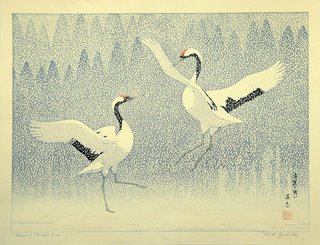 Sousaku Hanga woodblock print by Yoshida Toshi, ca. 1970 Compassionate Listening Practice by Thich Nhat Hanh
When we speak of listening with compassion, we usually think of listening to someone else. But we must also listen to the wounded child inside of us. The wounded child in us is here in the present moment. And we can heal him or her right now.
Practice: “My dear little wounded child, I’m here for you, ready to listen to you. Please tell me all your suffering, all your pain. I am here, really listening.” If you know how to go back to her, to him, and listen like that every day for five or 10 minutes, healing will take place. … Do that for a few weeks or a few months, the wounded child in you will be healed. Mindfulness is the energy that can help us do this. The Tibetan Bowl Timer will gently bring your practice to an end after 10 minutes.
—Thich Nhat Hanh, from Anger: Wisdom to Cool the Flames
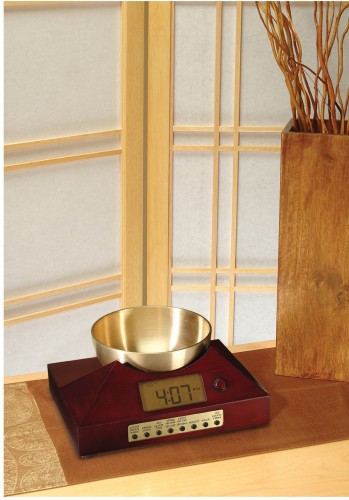 Zen Alarm Clock for a Gentle Awakening with a Bowl Gong and Mindfulness Timer Now & Zen
1638 Pearl Street
Boulder, CO 80302
Posted in Chime Alarm Clocks, Japanese Inspired Zen Clocks, Meditation Tools, mindfulness practice, Natural Awakening, Progressive Awakening, Yoga Timer, Zen Timepiece by Now & Zen, Zen Timers
 Kiyonaga Torii, Beauties Listening to Bonsai Vendor Ukiyo-e Woodblock Print How can we save the world from growing intolerance, how can we stop the spiral of violence? ‘ Silence is often the best answer,’ says the Dalai Lama. More and more experts are admitting he is right. This is not the time for analyses, reports and threats. We now need to stop and take the time to really listen to one another. Of course, listening is not always easy, but a growing number of initiatives are aiming to help people master this difficult art. The International Listening Association declared March to be International Awareness Month.
As part of their campaign they gave tips on how to listen. ‘Count to three when the person you are speaking with has finished talking. That person will often take this to be a signal to go on talking. You will be surprised at how much extra information you get. If you are interrupted, do not get irritated, do not attack and do not lecture, but simply say: “Please listen for a moment, I am not finished yet.”
The American psychologist Michael Kahn wrote a book that includes the topic of listening: The Tao of Conversation (Rainbow Pockets, 1998). He describes people entering a conversation with the intention of winning, people that only feel better if the other person feels worse. ‘We so badly want to be heard and confirmed that we think it is worth having an argument. ‘ The listener is the one who is catching his breath after having presented his view.
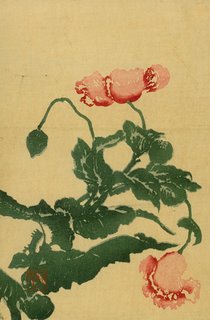 Peonies, c. 1900 unknown Kahn explains what a relief it was when he discovered a conversation does not have to be a contest. Like the Tao, it can flow calmly and peacefully and still be very powerful. Kahn’s tip: ‘Engage in a conversation as if you were making love to someone. Your good mood depends on how good the other feels. Or is your idea of a conversation a jam session, where musicians listen to each other and are inspired by each other? Ask yourself: Do I want to learn or do I want to win?’
Listening, true listening, heals. This was beautifully described years ago in Michael Ende’s classic Momo and the time savers. Because she is the only one in a hurried world who has time to really listen, the little vagabond girl Momo steals the hearts of all. Even children – taking after their parents – have less and less time for stories and games. In the end, Momo saves the city from the gloomy oppression of the grey men who are stealing everybody’s time. Listening as the solution to the world’s problems seems so simple, but in practice turns out to an enormous challenge. It is time we learned that history only repeats itself because nobody was listening the first time.
One of the ultimate Zen like experiences is waking-up from a great slumber refreshed and energized. Your mind and body are harmoniously one, both alert and focused. Having a refreshed mind and body are two keys to a natural and Zen lifestyle. Waking up in the morning should not be a loud and abrupt awakening, but rather it should be a peaceful positive experience. The right natural alarm clock can transition your deep and tranquil sleep into a serene start to consciousness. Imagine a long-resonating Tibetan bell-like chime waking you up to a beautiful morning experience.
The right alarm clock can be the most beneficial investment for you. With our Now & Zen natural alarm clock you are awakened more gradually and thus more naturally. Now & Zen is focused on creating a naturalistic lifestyle, and our clocks are an example of our philosophy.
 Bamboo Digital Chime Clock, a calming timer and alarm clock made from natural materials like bamboo, walnut, and maple adapted from Ode Magazine, April 2003 by Tijn Touber
Now & Zen’s Soothing Alarm Clock Store
1638 Pearl Street
Boulder, CO 80302
(800) 779-6383
Posted in Bamboo Chime Clocks, Chime Alarm Clocks, Goodness, Japanese Inspired Zen Clocks, Meditation Timers, Meditation Tools, mindfulness practice, Natural Awakening, Progressive Awakening, Truth, Well-being
 the beauty of imperfection Wabi and sabi refers to a mindful approach to everyday life. Over time their meanings overlapped and converged until they are unified into Wabi-sabi, the aesthetic defined as the beauty of things “imperfect, impermanent, and incomplete”.
Things in bud, or things in decay, as it were, are more evocative of wabi-sabi than things in full bloom because they suggest the transience of things. As things come and go, they show signs of their coming or going and these signs are considered to be beautiful.
In this, beauty is an altered state of consciousness and can be seen in the mundane and simple. The signatures of nature can be so subtle that it takes a quiet mind and a cultivated eye to discern them. In Zen philosophy there are seven aesthetic principles for achieving Wabi-Sabi.
Fukinsei: asymmetry, irregularity
Kanso: simplicity
Koko: basic, weathered
Shizen: without pretense, natural
Yugen: subtly profound grace, not obvious
Datsuzoku: unbounded by convention, free
Seijaku: tranquility
Each of these things are found in nature but can suggest virtues of human character and appropriateness of behaviour. This, in turn suggests that virtue and civility can be instilled through an appreciation of, and practice in, the arts. Hence, aesthetic ideals have an ethical connotation and pervades much of the Japanese culture.
adapted from wikipedia.org
 Zen Alarm Clock, Ukiyo-e Hokusai Wave Dial Face Now & Zen Headquarter Store
1638 Pearl Street
Boulder, CO 80302
(800) 779-6383
Posted in Bamboo Chime Clocks, Chime Alarm Clocks, Hokusai Wave, Japanese Inspired Zen Clocks, mindfulness practice, Natural Awakening, Now & Zen Alarm Clocks, Progressive Awakening, wabi-sabi
 Iris Bath by Utagawa Toyohara, Ukiyo-e Print
Compassion is that which makes the heart of the good move at the pain of others. It crushes and destroys the pain of others; thus, it is called compassion. It is called compassion because it shelters and embraces the distressed.
– The Buddha.
 Bamboo Digital Chime Clock, a meditation timer and alarm clock Now & Zen
1638 Pearl Street
Boulder, CO 80302
Posted in Bamboo Chime Clocks, Japanese Inspired Zen Clocks, Meditation Tools, mindfulness practice, Now & Zen Alarm Clocks, Progressive Awakening, Well-being
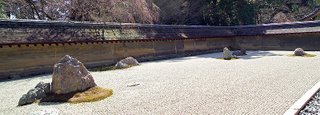 Stone garden in the karesansui style at Ryōan-ji. Karesansui Gardens or “dry landscape” gardens were influenced mainly by Zen Buddhism and can be found at Zen temples of meditation.
In Japanese culture, garden-making is a high art, intimately related to the linked arts of calligraphy and ink painting.
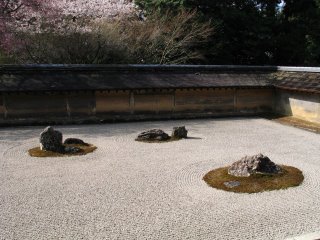 Ryōan-ji Unlike other traditional gardens, there is no water present in Karesansui gardens. However, there is raked gravel or sand that simulates the feeling of water.
The rocks/gravel used are chosen for their artistic shapes, and mosses as well as small shrubs are used to further garnish the Karesansui style (Japanese Lifestyle).
All in all, the rocks and moss are used to represent ponds, islands, boats, seas, rivers, and mountains in an abstract way. Ryoan-ji, temple in Kyoto, has a garden famous for representing this style. Daisen-in, created in 1513, is also particularly renowned.
adapted from wikipedia.org
 Zen Clocks by Now & Zen, Boulder, CO Now & Zen
1638 Pearl Street
Boulder, CO 80302
(800) 779-6383
Posted in Chime Alarm Clocks, mindfulness practice, Natural Awakening, Now & Zen Alarm Clocks, Zen Clocks and Dream Recall, Zen Timers
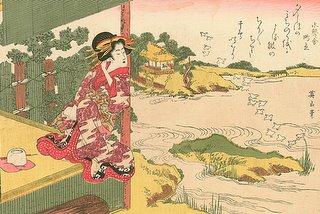 zen garden from tea house, Eizan (1787-1867), Noda River Ukiyo-e Often thought of as tranquil sanctuaries that allow individuals to escape from the stresses of daily life, Japanese gardens are designed for a variety of purposes. Some gardens invite quiet contemplation, but may have also been intended for recreation, the display of rare plant specimens, or the exhibition of unusual rocks.
adapted from wikipedia.org
 Bamboo Alarm Clocks & Meditation Timers Now & Zen
1638 Pearl Street
Boulder, CO 80302
Posted in Chime Alarm Clocks, Japanese Inspired Zen Clocks, Now & Zen Alarm Clocks, Progressive Awakening, Zen Clocks and Dream Recall, Zen Timers
 The famous moss garden of Saihō-ji. Saihō-ji is a Rinzai Zen Buddhist temple located in Matsuo, Nishikyō Ward, Kyoto, Japan. The temple, which is famed for its moss garden, is commonly referred to as “Koke-dera”, meaning “moss temple”, and is also known as “Kōinzan Saihō-ji”.
The famous moss garden of Saihō-ji is situated in the eastern temple grounds. Located in a grove, the garden is arranged as a circular promenade centered around Golden Pond. The pond is shaped like the Chinese character for “heart” or “mind” and contains three small islands: Asahi Island, Yūhi Island, and Kiri Island. The area around the pond is said to be covered with more than 120 varieties of moss, believed to have started growing after the flooding of the temple grounds in the Edo Period (1603 to 1868).
 Bamboo Zen Chime Clocks & Timers adapted from wikipedia.org
Now & Zen
1638 Pearl Street
Boulder, CO 80302
Posted in Bamboo Chime Clocks, Chime Alarm Clocks, Japanese Inspired Zen Clocks, Meditation Timers, Meditation Tools, Now & Zen Alarm Clocks, Progressive Awakening, Yoga Timer, Yoga Timers by Now & Zen
|
|
|
|